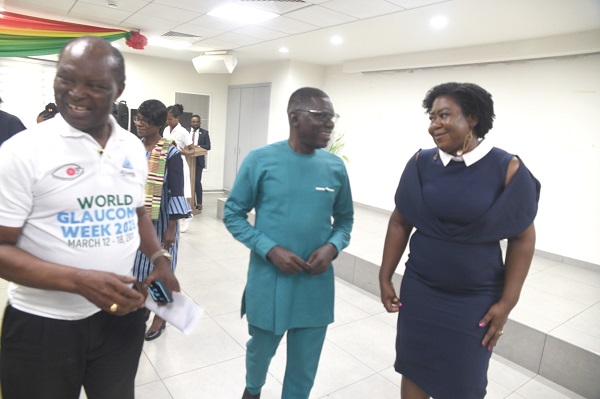
Over 500,000 living with glaucoma, others blind
More than 500,000 Ghanaians are living with glaucoma.
Of the figure, over 45,000 have gone irreversibly blind from the preventable and treatable eye condition.
The Ophthalmological Society of Ghana (OSG), which disclosed this, said the prevalence rate of eight out of every 100 people sampled in the country made Ghana’s burden the second highest in the world, after Barbados.
Speaking at the launch of the World Glaucoma Week (WGW) in Accra yesterday, the President of the OSG, Dr Dziffa-Bella Ofori-Adjei, said everybody was vulnerable to the eye condition which often showed no symptoms and underscored the need for people 40 years and above to get screened at least once a year.
Advertisement
She said researchers, both locally and globally, were still working to identify the causes of the condition, but noted that the known risk factors included ageing, being of Black descent, abuse of steroids and a positive family history.
She noted that although glaucoma was not curable, there was effective treatment, when picked early, that either delayed progression to blindness or prevented irreversible blindness.
The day
The WGW is a global initiative of the World Glaucoma Association (WGA) instituted to raise awareness of glaucoma.
The goal is to alert everyone to have regular eye (and optic nerve) checks in order to detect glaucoma as early as possible.
This year’s commemoration is on the global theme: “The world is bright, save your sight”, while “Do you know your eye pressure?
Get a check-up today!” has been added locally.
Glaucoma is an eye disorder that damages the optic nerve due to high build-up of fluid pressure in the eyes.
The condition has been nicknamed the “silent blinding disease” or the “sneak thief of sight” because there are usually no symptoms or pain associated with the onset and the loss of vision normally occurs gradually over a long period of time and is often identified when the disease is quite advanced.
Visual damage is mostly permanent or irreversible.
Interventions
Dr Ofori-Adjei said if the condition is detected early, interventions available included medications application and surgery.
She said glaucoma surgery was currently covered by the National Health Insurance Scheme and appealed to ophthalmologists to discuss the options with their patients, especially for those whose diagnosis was made much earlier in the disease onset.
She said although glaucoma was a treatable disease, it required the appropriate interventions across the management value chain to delay or prevent blindness.
“Medical treatment, although widely available in the country, is still outside the reach of many Ghanaians, as only a few of the medications used are currently on the NHIS.
I would like to use this opportunity to join my predecessors to ask for more glaucoma drugs to be included on the NHIS medicine list.
“In this case, there will be more effective drugs to help patients, many of whom are at the threshold of going blind,” she said.
In a speech read on his behalf, the Minister of Health, Kwaku Agyeman-Manu, said everybody who was vulnerable must avail himself or herself for screening.
He said the government would ensure that affordable eye medicines would be made available to control the condition, which is discovered only through screening.
Advocacy
The President of the Glaucoma Patients Association of Ghana and Vice-President of the World Glaucoma Association, Harrison Abutiate, said stakeholders had been talking about glaucoma every year for more than a decade but advocacy still remained relevant because screening was the only way to prevent the asymptomatic condition that stole sight silently and permanently.
“We will continue to talk about glaucoma until everybody in the country knows that you can only know about your status through screening and avail yourself for the screening and treatment options,” he said.
